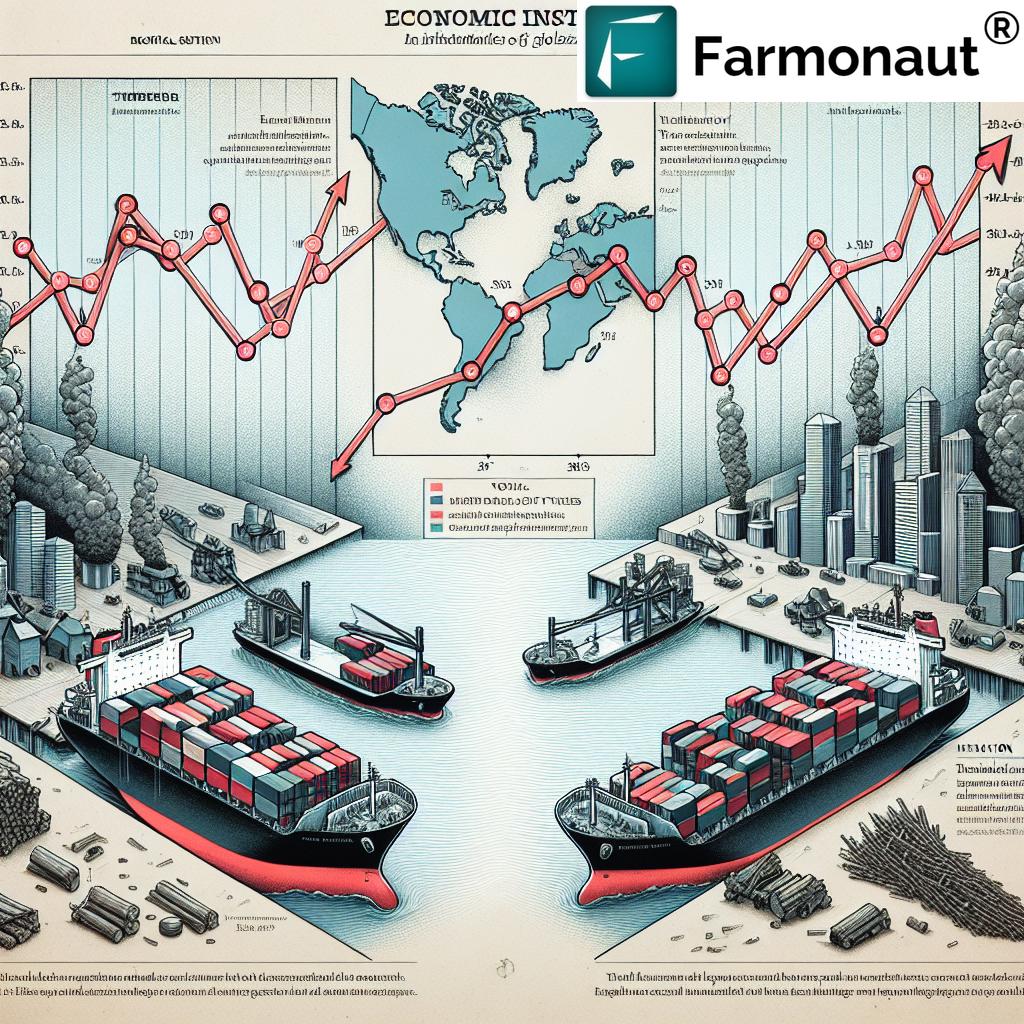Virginia’s Economic Uncertainty: Tariffs, Trade Wars, and Their Impact on Housing and Agriculture
“Recent surveys show growing pessimism about future business conditions, with 51% of consumers expecting a recession within 12 months.”
In the heart of Virginia, a state known for its rich agricultural heritage and thriving housing market, we find ourselves navigating through what can only be described as an “economic fog.” This uncertainty, driven by international trade policies and the looming specter of tariffs, is reshaping the economic landscape for businesses and consumers alike. As we delve into this complex issue, we’ll explore how these factors are impacting various sectors of Virginia’s economy, from the soybean fields of Dinwiddie County to the bustling construction sites of Richmond.
The Economic Impact of Tariffs on Virginia’s Agriculture
At the forefront of this economic uncertainty are Virginia’s farmers, who find themselves caught in the crosshairs of international trade disputes. Nick Moody, a Dinwiddie County farmer and president of the Virginia Soybean Board, voices concerns that resonate across the state’s agricultural community.
“Tariffs make us a little bit less reliable of a trading partner,” Moody observes, reflecting on the long-term effects of trade wars. His statement underscores a critical issue facing Virginia’s agricultural sector: the potential loss of foreign markets for key exports like soybeans.

The impact of tariffs extends beyond just market access. Farmers are also grappling with rising input costs, particularly for essential materials like potash fertilizer. With the United States importing over 80% of its potash from Canada, any trade friction with our northern neighbor could lead to significant price increases for this crucial agricultural input.
In light of these challenges, many Virginia farmers are turning to advanced agricultural technologies to optimize their operations and mitigate risks. Farmonaut’s crop plantation and forest advisory services offer valuable insights for farmers looking to maximize yields and manage resources efficiently in these uncertain times. By leveraging satellite-based crop health monitoring and AI-driven advisory systems, farmers can make more informed decisions about irrigation, fertilizer usage, and pest management, potentially offsetting some of the economic pressures brought on by tariffs and trade wars.
The Housing Market: Lumber Prices and Construction Costs
“Virginia’s lumber prices have fluctuated by up to 30% due to tariffs, impacting housing costs and construction projects statewide.”
The ripple effects of international trade disputes are not confined to agriculture. Virginia’s housing market, a crucial component of the state’s economy, is feeling the squeeze from potential tariffs on Canadian lumber. Andrew Clark, vice president of government affairs at the Virginia Association of Home Builders, expresses concern about the impact on potential home buyers and renters if lumber costs escalate due to trade tensions.
“Even the threat of tariffs, the idea of tariffs, that’s going to factor into the pricing (of housing),” Clark warns. This uncertainty is creating a challenging environment for builders and consumers alike, potentially driving up the cost of new homes and rental properties across the state.
Jackie Bates, executive vice president at Annandale Millwork and Allied Systems Corp., a Winchester supplier of framed walls for home construction, predicts immediate price increases if threatened tariffs are implemented. “I guess the big picture is, higher costs are coming for lumber,” Bates states, highlighting the industry’s readiness to absorb and pass along these increased costs.
For those in the construction and real estate sectors, staying informed about market trends and leveraging data-driven insights has never been more critical. Farmonaut’s fleet management solutions can help construction companies optimize their logistics and reduce operational costs, potentially offsetting some of the financial pressures caused by rising material prices.
Consumer Sentiment and Economic Outlook
As we navigate through this period of economic uncertainty, consumer sentiment serves as a crucial barometer of the overall economic health. Recent surveys paint a concerning picture of growing pessimism among Virginia’s consumers and businesses alike.
The Conference Board’s “expectations index” for short-term consumer confidence has plummeted to its lowest level in 12 years. This decline is particularly notable in consumers’ outlook on future business conditions and employment prospects. Stephanie Guichard, a senior economist at The Conference Board, notes, “Consumer expectations were especially gloomy, with pessimism about future business conditions deepening and confidence about future employment prospects falling to a 12-year low.”

Similarly, the University of Michigan’s national survey reveals a 12% drop in consumer sentiment from February to March, with expectations falling by 30% since November. Alarmingly, consumers now anticipate inflation to rise to 5% in the coming year, the highest reading since November 2022.
These findings align with the most recent quarterly survey of Virginia consumers conducted by the Roanoke College Institute for Policy and Opinion Research. While the survey indicated a strong labor market and consumer spending, it also revealed falling expectations due to tariff-driven fears of rising inflation and economic uncertainty.
The “Economic Fog” and Its Implications
Tom Barkin, president of the Federal Reserve Bank of Richmond, aptly describes the current economic climate as “driving through economic fog.” This metaphor captures the essence of the challenges facing businesses and consumers in Virginia and beyond.
“With all this change, a dense fog has fallen,” Barkin explains. “It’s not an everyday ‘forecasting is hard’ type of fog. It’s a ‘zero visibility,’ pull over and turn on your hazards type of fog.”
This lack of clarity is particularly challenging for businesses trying to make investment decisions and plan for the future. The uncertainty surrounding tariffs and trade policies has created a wait-and-see atmosphere, potentially slowing economic growth and job creation.
For farmers and agribusinesses navigating this economic fog, tools like Farmonaut’s carbon footprinting services can provide valuable insights. By tracking and managing their environmental impact, agricultural operations can position themselves for long-term sustainability and compliance with evolving regulations, even amidst economic uncertainty.
The Role of Technology in Mitigating Economic Uncertainties
As Virginia’s businesses and consumers grapple with the challenges posed by tariffs and trade wars, technology emerges as a crucial tool for navigating these uncertain times. Advanced agricultural technologies, in particular, offer promising solutions for farmers looking to optimize their operations and reduce vulnerability to market fluctuations.
Satellite-based crop health monitoring, for instance, allows farmers to make data-driven decisions about resource allocation, potentially reducing input costs and improving yields. This technology, coupled with AI-driven advisory systems, can help farmers adapt more quickly to changing market conditions and environmental factors.
For those in the agricultural sector seeking to leverage these technologies, Farmonaut’s comprehensive farm management solutions offer a range of tools designed to enhance productivity and resilience in the face of economic challenges.
The Importance of Supply Chain Transparency
In an era of economic uncertainty and shifting trade relationships, supply chain transparency has become more critical than ever. For Virginia’s businesses, particularly those in the agricultural and manufacturing sectors, the ability to trace products from farm to consumer can provide a significant competitive advantage.
Blockchain-based traceability solutions, such as those offered by Farmonaut, can help businesses ensure the authenticity and quality of their products. This technology not only builds consumer trust but also helps companies navigate complex international trade regulations and tariff structures more effectively.
Economic Impact Comparison Across Virginia’s Sectors
| Sector | Tariff/Trade War Effect | Estimated Economic Impact | Consumer Sentiment | Future Outlook |
|---|---|---|---|---|
| Agriculture (Soybeans) | Reduced exports to China | 15-20% revenue decrease | Pessimistic | Uncertain, seeking new markets |
| Housing/Construction | Increased lumber costs | 5-10% rise in housing prices | Cautious | Dependent on tariff negotiations |
| Manufacturing | Higher input costs | 3-7% increase in production costs | Concerned | Exploring domestic alternatives |
| Consumer Goods | Price increases on imports | 2-4% inflation on affected goods | Wary of price hikes | Potential shift to local products |
| Technology | Supply chain disruptions | 1-3% decrease in profit margins | Mixed | Investing in supply chain resilience |
Looking Ahead: Strategies for Economic Resilience
As Virginia’s businesses and consumers navigate these turbulent economic waters, developing strategies for resilience becomes paramount. Here are some key approaches that stakeholders across various sectors can consider:
- Diversification of Markets: For farmers and exporters, exploring new international markets can help mitigate the impact of trade wars with specific countries.
- Investment in Technology: Adopting advanced technologies like precision agriculture and supply chain management systems can improve efficiency and reduce costs.
- Focus on Sustainability: Implementing sustainable practices can not only reduce environmental impact but also appeal to eco-conscious consumers and potentially open up new market opportunities.
- Enhanced Supply Chain Management: Improving supply chain visibility and flexibility can help businesses adapt more quickly to trade policy changes and market fluctuations.
- Consumer Education: Educating consumers about the factors influencing prices and the importance of supporting local industries can help build community resilience.
The Role of Government and Policy Makers
As Virginia grapples with these economic challenges, the role of government and policy makers becomes increasingly important. Governor Glenn Youngkin, for instance, remains optimistic about Virginia’s economic prospects, citing interest from international firms in relocating to the state.
“I’m seeing interest from U.S.-based international firms, interested in redomiciling here, and international firms interested in U.S. facilities,” Youngkin stated. He particularly highlighted the Port of Virginia as a significant asset, capable of handling both exports and imports efficiently.
However, the governor’s optimism is tempered by the concerns of economists and industry leaders. Bob McNabb, chair of the Department of Economics at Old Dominion University, presents a nuanced view of the potential outcomes:
“In the best-case scenario, tariffs do not disrupt supply chains, any inflationary pressures are transitory, and businesses onshore to gain access to U.S. markets. In other cases, the disruptions to global supply chains lead firms to shift global supply chains away from the United States and the emergence of new trading alliances that leave the U.S. in the cold.”
This perspective underscores the complexity of the situation and the need for carefully crafted policies that can navigate the delicate balance between protecting domestic industries and maintaining beneficial international trade relationships.
The Importance of Data-Driven Decision Making
In these uncertain times, the value of data-driven decision making cannot be overstated. For businesses across all sectors, having access to accurate, real-time data can make the difference between thriving and merely surviving in a challenging economic environment.
For those in the agricultural sector, tools like Farmonaut’s crop loan and insurance services can provide valuable data to support financial planning and risk management. By leveraging satellite-based verification for crop loans and insurance, farmers can improve their access to financing while reducing risks for lenders.
Conclusion: Navigating the Economic Fog
As we’ve explored throughout this analysis, Virginia’s economy is facing a period of significant uncertainty due to the impact of tariffs, trade wars, and their ripple effects across various sectors. From the soybean fields of Dinwiddie County to the construction sites of Richmond, businesses and consumers alike are grappling with the challenges posed by this economic fog.
However, amidst these challenges, there are also opportunities for innovation and adaptation. By leveraging advanced technologies, diversifying markets, and focusing on sustainability, Virginia’s businesses can position themselves for resilience and growth, even in uncertain times.
As we move forward, it will be crucial for all stakeholders – from farmers and builders to policy makers and consumers – to stay informed, adaptable, and collaborative in their approach to navigating these economic challenges. By doing so, Virginia can emerge from this period of uncertainty stronger and more resilient than ever.
FAQ Section
- How are tariffs affecting Virginia’s agricultural sector?
Tariffs are impacting Virginia’s agricultural sector by reducing export opportunities for key crops like soybeans and increasing input costs for essential materials like fertilizers. - What impact are trade wars having on Virginia’s housing market?
Trade wars are potentially increasing the cost of construction materials, particularly lumber, which could lead to higher housing prices and affect affordability for buyers and renters. - How is consumer sentiment in Virginia being affected by economic uncertainty?
Recent surveys indicate growing pessimism among Virginia consumers, with concerns about future business conditions, employment prospects, and inflation expectations. - What strategies can Virginia businesses use to navigate economic uncertainty?
Businesses can consider diversifying markets, investing in technology, focusing on sustainability, enhancing supply chain management, and leveraging data-driven decision-making tools. - How can farmers in Virginia mitigate the risks associated with trade wars and tariffs?
Farmers can explore new markets, adopt precision agriculture technologies, and utilize tools like satellite-based crop monitoring and AI-driven advisory systems to optimize their operations and reduce vulnerabilities.
As we continue to navigate these challenging economic times, staying informed and adaptable will be key to success. For those in the agricultural sector looking to leverage technology to enhance their resilience, consider exploring Farmonaut’s suite of advanced farm management solutions:
Earn With Farmonaut: Join our affiliate program and earn 20% recurring commission by sharing your promo code and helping farmers save 10%. Onboard 10 Elite farmers monthly to earn a minimum of $148,000 annually—start now and grow your income!





















